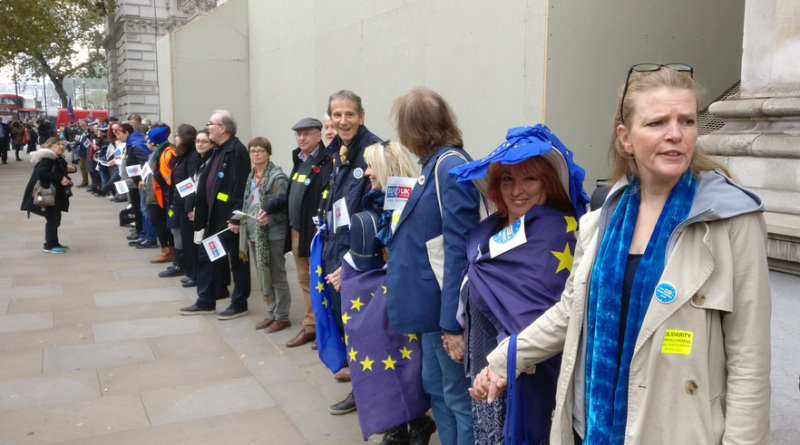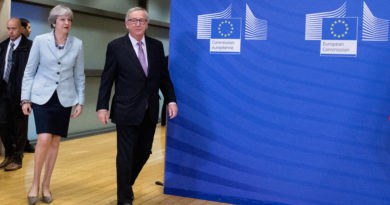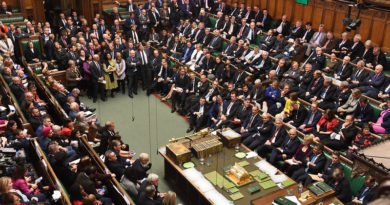Human chain in Westminster to end uncertainty over post-Brexit rights
Groups campaigning for the rights of EU nationals living in the UK and British residents in the EU plan to form a human chain in Westminster on Monday 5 November. They will ask the British government to put an end to the uncertainty and secure the status of people who moved across the Channel, regardless of the outcomes of Brexit talks.
The human chain will start in Parliament Square and end in 10 Downing Street, where groups the3million and British in Europe, with trade union Unison, plan to deliver a letter to Prime Minister Theresa May. The letter says:
We are calling for the EU and the UK to honour under Article 50, as a minimum, the agreement already reached on citizens’ rights – whatever the outcome of Brexit. We urge you to approach Michel Barnier and the EU27 member states and suggest committing now to implementing the citizens’ rights part of the draft Withdrawal Agreement (WA), even if it is the only aspect to be agreed on.
The demand is supported by a cross-party group of MPs. The programme of the day is available here.
EU citizens have the right to settled in other EU countries thanks to free movement rules. These, however, will no longer apply in the UK and to British nationals living in the EU when the UK will leave the EU. In December 2018, the EU and the UK reached an agreement to protect the post-Brexit rights of citizens who moved across the Channel. In March 2018, the political deal was translated into a draft legal text forming part of the withdrawal agreement. The agreement is yet to be confirmed as negotiations in other areas have not been finalised.
Nicolas Hatton, co-founder of the3million, a groups promoting the rights of EU nationals in the UK, said: “Despite all the promises, our rights are still not sorted and there is very little time to make a difference. We are asking MPs and the British government to give us true peace of mind over our future, by protecting and guaranteeing our existing rights under international law using the Article 50 procedure.”
Campaigners say that unilateral guarantees will not be enough because they will not secure transnational rights, such as the aggregation of pension contributions or access to healthcare when travelling in the respective territories.
Jane Golding, chair of British in Europe, added: “We urge both sides to agree to ring-fence the existing citizens’ rights deal – imperfect as it is – now so that affected people can try to get on their lives in case talks collapse and there is no deal.” Campaigners are also asking to improve the deal on the table.
Confusion over no deal scenario
Adding to the uncertainty, this week the UK Home Secretary had to provide clarifications on the future status of EU nationals after an announcement by Immigration Minister Caroline Nokes threw people into further disarray.
Nokes told the House of Commons Home Affairs committee that, in case of no-deal Brexit, employers in Britain would be responsible for checking whether EU nationals have the right to work in the UK. In practice, it would be impossible after 29 March 2019 to differentiate EU citizens already in the UK, who have the right to stay, from those arriving after Brexit, for whom new rules are expected.
So after yesterday’s confusion at @CommonsHomeAffs over Govt No Deal immigration plans here’s a thread on what I think we gleaned (and yes I know it’s full of contradictions & I assume some bits are wrong but afraid I don’t know which bits) https://t.co/r0Yzwi9nFq
— Yvette Cooper (@YvetteCooperMP) October 31, 2018
Home Secretary Saijd Javid had to clarify that in the case of no deal, a “sensible transition period” will be put in place.
.@sajidjavid says employers will still have to do a right to work check in the case of no deal, but there must be a “sensible transition period” which will be set out in due course. #Peston pic.twitter.com/55CIAQlAsS
— Peston (@itvpeston) October 31, 2018
First results of settled status trial
Meanwhile, the Home Office published the results of the first pilot phase of the “settled status” scheme, which has been designed to recognise the status of EU nationals in the UK post-Brexit.
EU citizens working at 12 NHS Trusts, and students and staff from 3 Liverpool universities were invited to test the online application process between 28 August and 17 October. 1,053 applications were submitted in that period, out of 4,000 potential candidates.
By October 30, the Home Office said to have made 924 decision. 591 (64%) people were granted settled status and 333 (36%) obtained pre-settled status (this applies when the 5-year residency requirement has not been met yet). 129 decisions were still pending.
According to Home Office data, 787 of cases (85%) were decided based on automated checks and 137 (15%) had to supply additional evidence. The average time taken on decisions was under 9 calendar days, the Home Office reported.
The second pilot phase, open to all EU staff in the higher education and healthcare sectors, started on November 1st. The scheme will be fully operational from 30 March 2019 and EU nationals will have until 30 June 2021 to apply.
Claudia Delpero © all rights reserved.
Photo of the human chain, courtesy Axel Antoni, the3million.




